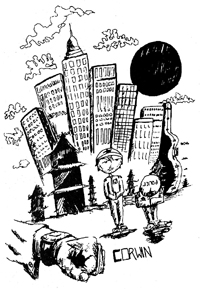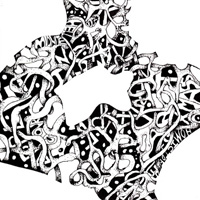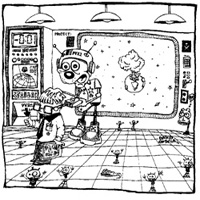 Upside Down Guitar Man in the Land of the Rising Sun
Upside Down Guitar Man in the Land of the Rising Sun
by Patrick Timony
illustration by Jim Corwin
“Oh my God, we’re going to crash!” I scream from the back seat, looking out the front window of the police car. We are traveling at 70 mph down the wrong side of a six-lane highway. The Japanese policeman in the passenger’s seat jumps at the sound of my voice and throws his paperwork into the air. The driver jerks the wheel and swerves into the next lane at my scream but quickly regains control of the car. His police hat is knocked askew. The first policeman starts to scream in Japanese at the driver, berating him for making the car swerve – or maybe for paying attention to the gai-jing in the back seat, I can’t tell which.
I’m in Japan, I suddenly realize – we’re supposed to be on the wrong side of the road. Or is this really the wrong side of the road? I’ve been through so many countries in the last year I can’t remember up from down much less which side of the road we’re supposed to be on. America – right, England – left, Europe – right, Thailand – left. It’s like Cain and Abel decided that rather than settle their differences with a shepherd’s crook, which can only inflict a limited amount of pain on as many people as it can come in contact with before it rots into mush, they would inflict an exponentially greater amount of pain on a proportionally greater number of people by having their respective descendants driving on opposite sides of the road. Something simpler and more delineated to fight about than religion.
And on the losing end of this worldwide family feud are, of course, poor travelers like me who go through enough different side-of-the-road zones in a short enough period of time to keep them permanently confused, planted on the corner – refusing to step out into the street for fear that a car will come out of some unexpected direction, or screaming bloody murder from the back of a Japanese police car because they wake up from a daydream thinking they are on the wrong side of the road.
The police had picked me up in Ginza, the expensive shopping district, for playing my guitar upside down on the street. Because none of the officers who arrested me could speak English, and because Japanese people are murderously attached to traditional ways of doing things, I couldn’t tell if they were arresting me for playing on the street or playing upside down. But I found out when I got to the police station and was introduced to the only member of the Tokyo police force who could speak English, that it was neither of these. I was being arrested on suspicion of overstaying my visa. “What petty, unromantic bullshit! I refuse to be arrested for anything less than creating a nuisance, or at least playing unconventionally,” I thought. But the Japanese policemen were so polite and inoffensive about arresting me that I didn’t force the point.
I am blushing with shame and embarrassment at having caused such havoc in the police car. The only English speaking policeman in Tokyo is still cursing from the passenger’s seat and the driver’s hands are shaking on the steering wheel. I start to try to apologize but the English speaking policeman stops me and tells me it’s not my fault. He smiles obsequiously and tries to turn around and bow from the front seat. These Japanese policemen are great.
When the police had picked me up at Ginza and had started to escort me away from the scene of my musical crime, the editor of Look Magazine Japan had emerged from the crowd and asked for my telephone number so she could interview me. I called it over my shoulder as the police dragged me around the corner, politely, and the crowd cheered. I was looking forward to becoming famous if I ever got back into my apartment to receive her phone call for the interview.
When I found out the police wanted me for overstaying my visa, my only fear was that I wouldn’t be able to get into my apartment to get my passport. Colleen, my high-fashion model girlfriend was supposed to be leaving today for a week-long shoot on a Pacific island, and I had left my keys, along with my passport, inside our apartment.
If the Japanese policemen and I could get to the apartment before Colleen left for her week-long Pacific island shoot, she could let us in and I could show them that my visa was okay, stay in Japan, do the Look Magazine interview, become famous and live with Colleen happily ever after. If we missed Colleen, I would be stuck in police custody and probably deported before she could get back from the Pacific island shoot, miss the Look Magazine interview, never become famous, probably never see Colleen again, and otherwise be greatly inconvenienced.
After a while, the only English speaking policeman in Tokyo stops cursing at the driver and we watch Tokyo float by the police car windows. I try to make small talk but the English speaking policeman’s English isn’t good enough. I am eager to get to the apartment before Colleen leaves.
I direct them to Colleen’s apartment and they escort me to the door. I think they are a little surprised to see that a bum like me lives in a fashionable Ripungi apartment such as Colleen’s. She pays the modeling agency 250,000 yen a month for it ($2,000), but it’s okay because she earns about half that every day she works. Tokyo’s a good place for money. Although I’m not up to Colleen’s standards, I can’t complain either. I make about 30,000 yen ($250) for playing my guitar six hours a day
So understandably, I’m sweating bullets as to whether Colleen’s going to be home or not. I don’t want to be deported and never get a chance to come back to this land of fiscal milk and honey, much less all the other horrible stuff I already mentioned. So with trepidation and oh-please-oh-please-oh-please-ness I slowly raise my hand to knock on the door. I think the Japanese policemen are looking at my disheveled clothing and my battered guitar case and the door of the fashionable apartment I am about to knock on and thinking that I have led them on a wild Japanese goose chase.
“Colleen, if you are not here, I well never speak to you again,” I think, not so much in threat as in prediction. Magically, as my hand swings towards the door, it opens and my hand swishes through empty space and nearly knocks Colleen in one of her beautiful breasts. Her breasts point at me indignantly as if to accuse me of trying to knock them. She looks at me, and at the Japanese policemen who are quaking in her radiance, and back at me again. “Patrick,” she says, “look what followed you home from Ginza.”
“They speak English,” I try to disguise under a mumble of salutation as I hug her. “I just need my passport.”
I am thinking self-righteously that these policemen must be impressed by my girlfriend’s expensive apartment, when I realize that every apartment in Tokyo costs $2000 a month and that the quaky and obsequious movements the policemen have been going through are run-of-the-mill behavior for Japanese people.
The policemen leave their shoes just inside the door and come tiptoeing into the apartment spouting “sorry”s and “please”s and “se-ma-sen”s (that ‘s ‘excuse me’ for all you gai-jing). Colleen and I sit over to one side of the couch leaving ample space for them to sit and do the paper work they have just pulled out of their briefcases. But they politely decline and kneel, sitting on their stockinged feet, kindergarten-girl style in front of the coffee table, preferring, I suppose, not to offend us by using our furniture.
The only slightly confrontational thing the police say the whole time they are in our apartment is when one of them questions whether the passport is really mine. The driver grunts questioningly when he first opens my passport. The other one, the English speaker, says, indicting his partner from his kneeling position on the floor, “He say that not you.” I explain to them about the fiasco at the passport office when I got my picture taken, about the way the photographer asked me a question right before he snapped the picture and how I was caught in mid-answer. They look like either they don’t believe me or they can’t understand me. I can’t tell which. But they continue filling out their paperwork so I don’t bring up the subject again.
Finally they finish their paperwork, bow servilely, and leave without leaving so much as a tuft of sock lint on our carpet. Colleen and I issue a simultaneous sigh of relief and fall back on our un-Japanese-policeman-bottom-imprinted couch. “What was that all about?” says Colleen.
I tell her the whole story and she laughs. She says that she told me she wasn’t leaving for the Pacific island until 8:00 that night. I say I had forgotten, and let her believe that I mean that I had forgotten before – but I remember now – when I really mean that I still don’t remember her saying anything about leaving at 8:00. The relief and the catharsis makes us horny and we spend four hours or so before her plane leaves copulating furiously.
Colleen leaves, I sleep and the next day the Look Magazine editor calls me and invites me to lunch at a tea shop in Ripungi. I meet her at 12:00 at the subway stop and we walk to the tea shop. She can’t speak English very well but has brought along an American intern who translates for us. So I spend most of the interview talking to the American intern.
The intern is 22 and just out of Harvard. She is pretty and bright but a little stilted. She has that fresh-out-of-college-and-eager-to-please blush about her cheeks that makes you like her now but think that you would hate her if you were her age. We know a few people in common who went to Harvard and become tangled in a game d’y’know so-and-so. The Look Magazine editor walks silently and politely by our side on the way to the tea shop.
When we get there, I commit some kind of faux pas by ordering beer instead of tea. The Look Magazine editor and her intern look across the table at me like they are sucking on fecal lifesavers. “It’s only 12:00, you know,” says the intern, giving away the fact that she hasn’t learned anything from her travels through the intonation in her voice. I light up a cheap, tasteless Japanese cigarette and sigh.
Otherwise, the interview goes smoothly except for the occasional bitter looks at my five dollar Saporo and my tasteless cigarette. I try to give them a good picture of what being an internationally-traveling street musician is like: The long hours, the money, the women, the fame and fortune, but my words never seem to do justice to it. After the interview, the editor gives me about the equivalent of 100 dollars in cash. “Easy money,” I think.
I’m not sure if they ever put the interview in the magazine because I left Japan before it would have come out. But I’m not famous yet, at least that I’m aware of, and that’s a bad sign. It must have been the beer and the cigarette. But I stayed with Colleen, happily-ever-after, for about 2 months, and I did get to do the interview with Look Magazine. So I guess I come out of that one ahead, which is pretty good when you consider that I could have been dumped onto some dingy boat for the deportation ride home instead of having sex with Colleen or getting paid to tell people about myself – and even better when you consider that I now live in America, a ridiculous excuse for a country, work as a corporate secretary, have no friends and hate life. So sometimes you win ’em, sometimes you work in the Prudential Tower and say, “Great!”, “Can I help you, sir?”, and “Can I put you through to voice mail?” a lot. But this is my lot in life so I guess I’ll bite the bullet and learn to love… Oh, fuck it, I’m going back to Japan. See ya later.



